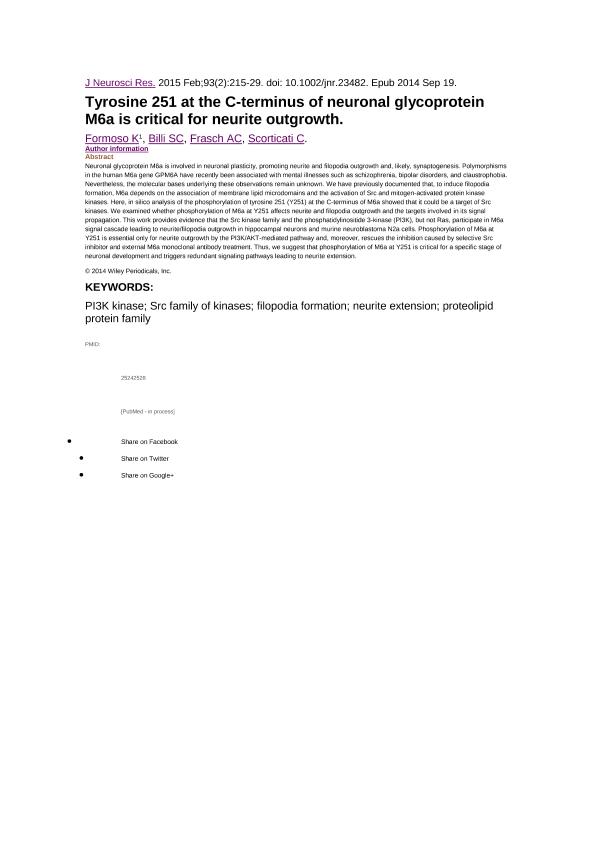Artículo
Tyrosine 251 at the C-terminus of Neuronal Glycoprotein M6a is Critical for Neurite Outgrowth
Fecha de publicación:
09/2015
Editorial:
Wiley-liss, Div John Wiley & Sons Inc
Revista:
Journal of Neuroscience Research
ISSN:
0360-4012
Idioma:
Inglés
Tipo de recurso:
Artículo publicado
Clasificación temática:
Resumen
Neuronal glycoprotein M6a is involved in neuronal plasticity, promoting neurite and filopodia outgrowth and, likely, synaptogenesis. Polymorphisms in the human M6a gene GPM6A have recently been associated with mental illnesses such as schizophrenia, bipolar disorders, and claustrophobia. Nevertheless, the molecular bases underlying these observations remain unknown. We have previously documented that, to induce filopodia formation, M6a depends on the association of membrane lipid microdomains and the activation of Src and mitogen-activated protein kinase kinases. Here, in silico analysis of the phosphorylation of tyrosine 251 (Y251) at the C-terminus of M6a showed that it could be a target of Src kinases. We examined whether phosphorylation of M6a at Y251 affects neurite and filopodia outgrowth and the targets involved in its signal propagation. This work provides evidence that the Src kinase family and the phosphatidylinositide 3-kinase (PI3K), but not Ras, participate in M6a signal cascade leading to Neurite/filopodia outgrowth in hippocampal neurons and murine neuroblastoma N2a cells. Phosphorylation of M6a at Y251 is essential only for neurite outgrowth by the PI3K/AKT-mediated pathway and, moreover, rescues the inhibition caused by selective Src inhibitor and externalM6a monoclonal antibody treatment. Thus, we suggest that phosphorylation of M6a at Y251 is critical for a specific stage of neuronal development and triggers redundant signaling pathways leading to Neurite extension.
Archivos asociados
Licencia
Identificadores
Colecciones
Articulos(IIB-INTECH)
Articulos de INST.DE INVEST.BIOTECNOLOGICAS - INSTITUTO TECNOLOGICO CHASCOMUS
Articulos de INST.DE INVEST.BIOTECNOLOGICAS - INSTITUTO TECNOLOGICO CHASCOMUS
Citación
Formoso, Karina; Billi, Silvia Cristina; Frasch, Alberto Carlos C.; Scorticati, Camila; Tyrosine 251 at the C-terminus of Neuronal Glycoprotein M6a is Critical for Neurite Outgrowth; Wiley-liss, Div John Wiley & Sons Inc; Journal of Neuroscience Research; 93; 2; 9-2015; 215-229
Compartir
Altmétricas




